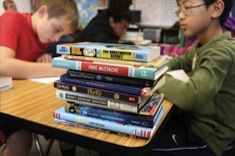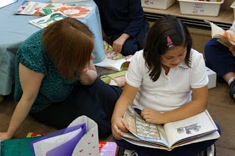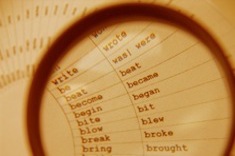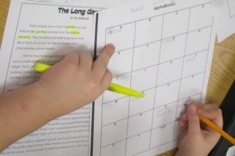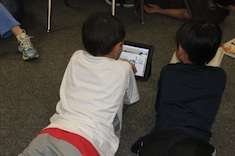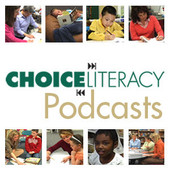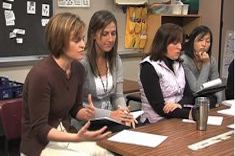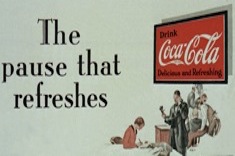Articles
Here is where you’ll find all the latest print features from our contributors. If you’d like to browse specifically by grade level, topic, or contributor, you can use the links in the right sidebar.
Latest Content
The Gifts of Literacy
Kelly Petrin reflects on what she values most in the final days with children in her preschool program, and what she shares with parents.
Making Summer Reading Plans
Clare Landrigan and Tammy Mulligan have advice for making summer reading plans with students. This is the next installment in their summer reading series.
Getting Books into Students’ Hands for Summer Reading
Clare Landrigan and Tammy Mulligan share tips for getting books to students for summer reading. This is the first installment in their new summer reading series.
Reading Through Spring
Gigi McAllister has many suggestions for a strong reading finish to the school year.
End-of-Year Literacy Interviews
Ruth Shagoury explains why year-end interviews are so valuable, and includes questions to use in your interviews.
April Literacy Contracts: Discovery
Megan Ginther and Holly Mueller choose a theme of discovery for their April literacy contracts.
Phrasal Verbs and English Language Learners
Jennifer Schwanke writes about the need for teachers to understand how phrasal verbs work and why it is essential to teach them explicitly to English language learners.
Working with Emergent Bilingual Children (PODCAST)
In this podcast, Heather Rader chats with Ruth Shagoury about working with emergent bilingual chidren and their families.
Remembering to Slow Down at the End of the School Year
Maria Caplin shares her strategies for slowing down at the end of the year with her fifth graders and reflecting on the growth and learning that can't easily be measured with tests.
Nonfiction and English Language Learners
Stella Villalba has advice about connecting nonfiction, young English language learners, and the Common Core.
Creating Video with Students: Tools and Tips
Bill Bass gives advice and provides resources for creating video with high school students.
Celebrating Screen-Free Week (BOOKLIST)
Screen-Free Week is scheduled for May 5-11 this year. Here are some book suggestions to help you explore the issue with students.
Connecting Class Social Media in Eight Simple Steps
Colby Sharp shares step-by-step guidance for linking class blogs, Twitter and private Facebook pages when sharing with families. Best of all, you can turn over the task to students.
Getting Started with Blogging in Fifth Grade
Katherine Sokolowski presents some strategies from her fifth-grade classroom for launching student blogs.
A Booklist for Earth Day
Earth Day is celebrated on April 22. Sarah Klim presents some favorite titles to share with students and build awareness in this booklist.
Finding Meaning and Joy in Teaching: A Podcast with Meenoo Rami
In a new podcast, Meenoo Rami talks about ways teachers can bring energy and joy back into their teaching.
Brave Noah
Ruth Ayres tells the story of Noah, a brave first grader with a hard home life who has few happily ever afters as a writer.
Mentor Reader: Words
Gigi McAllister writes about a quick activity for modeling word learning and fostering discussion of new vocabulary.
Expanding the Literacy Classroom with Flipped Minilessons
Katharine Hale tries some flipped minilessons in her fifth-grade classroom and explains how technology is providing new opportunities for student learning.
Poemfields
Shirl McPhillips captures beautifully the “hard knuckle” of the end of winter and the slow turn to spring in a new poem and reflection.
Word Observations
Max Brand describes how word observations can work as powerful minilessons in elementary classrooms.
Katie DiCesare on Word Learning (PODCAST)
Katie DiCesare chats with Franki Sibberson about word learning in Katie’s first-grade classroom.
Simplifying Word Study
Max Brand has suggestions for simplifying word study.
March Literacy Contracts: Nonfiction Curiosities
This month’s literacy contract for middle school students focuses on nonfiction texts and growing independence in the classroom.
Bracketology
Mary Lee Hahn uses bracketology to help her fifth-grade students explore determining importance in short texts and close reading.
The Pause That Refreshes: Write When the Conversation Gets Hot
When’s the best time for some spontaneous opinion writing? Suzy Kaback argues it’s when class conversations get hot.
So You Think You Can Combine Sentences? You Can!
Heather Rader concludes her series on sentence combining with a four-step process to help teachers explore the sentence combining craft on their own.
Writing Fiction: More Than Just a Walk in the Park
Is there room for fiction writing in middle schools in the age of the Common Core? Katie Baydo-Reed shares eight compelling reasons why fiction writing is still essential in her eighth-grade classroom.
Sentence Combining in Workshops
Heather Rader has strategies for using sentence combining in literacy workshops.
The Power of Mystery Series for Teens and Tweens
Ruth Shagoury shares her top picks of mystery series for teens and tweens.
Browse Content By
Type
Category
- Assessment Tools
- Big Fresh Archives
- Booklists
- Choice Numeracy
- Classroom Design
- Common Core
- Community Building
- Conferring
- Content Literacy
- Digital Literacy
- English Language Learners
- Equity
- Family Relations
- Free Samples
- Guiding Groups
- Leadership
- Literacy Coaches
- Mentor Texts
- Minilessons
- New Teacher Mentors
- Podcasts
- Poetry
- Quote Collections
- Reading Strategies
- Self Care
- Struggling and Striving Learners
- Talking and Listening
- Teacher Study Groups
- Teaching Reading
- Teaching Writing
- Word Study and Vocabulary
Author
- Melissa Quimby
- Nawal Qarooni
- Gwen Blumberg
- Julie Cox
- The Lead Learners
- Hannah Tills
- Josie Stewart
- Ruth Metcalfe
- Mallory Messenger
- Becca Burk
- Jodie Bailey
- Vivian Chen
- Mary Brower
- Tiffany Abbott Fuller
- Stephanie Affinito
- Ruth Ayres
- Leigh Anne Eck
- Heather Fisher
- Shari Frost
- Julie Johnson
- Suzy Kaback
- Gigi McAllister
- Shirl McPhillips
- Melanie Meehan
- Cathy Mere
- Debbie Miller
- Tara Barnett and Kate Mills
- Tammy Mulligan
- Dana Murphy
- Bitsy Parks
- David Pittman
- Brenda Power
- Heather Rader
- Matt Renwick
- Mandy Robek
- Christy Rush-Levine
- Gretchen Schroeder
- Jen Schwanke
- Brian Sepe
- Katherine Sokolowski
- Stella Villalba
- Jennifer Vincent
Grade Level
Choice Literacy Membership
Articles
Get full access to all Choice Literacy article content
Videos
Get full access to all Choice Literacy video content
Courses
Access Choice Literacy course curriculum and training



